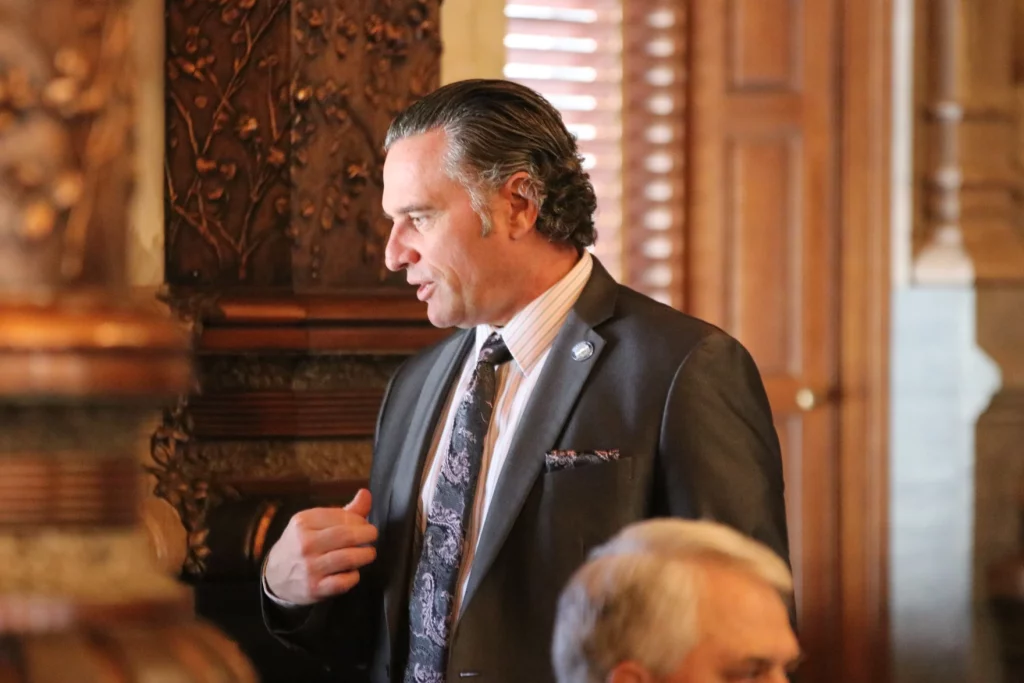The Republican-dominated Kansas Senate has passed a pair of bills that would drastically reduce taxes on income and retirement payments.
With the spring legislative session about halfway over, the Senate has also passed a plan to eliminate both state and local sales tax on some groceries.
The House will need to approve the bills to send them to Democratic Gov. Laura Kelly, who’s likely to veto them.
With a $2 billion budget surplus, the passage of some form of tax cuts looks like a near certainty — along with a showdown from a governor who’s called the Legislature’s plans “irresponsible.”
Kelly has her own ideas on cutting taxes — most notably eliminating the sales tax on groceries immediately. She’s also warned she will block cuts sent to her desk that she concludes carve too deeply into the revenues that pay for state services. She recently said the Republican proposals would drain the state budget too dramatically.
“When I look at the structural balance,” Kelly said, “there’s no doubt it’s not sustainable.”
But the bills may serve as a starting point for negotiations between the Legislature’s leaders and Kelly. Republican Senate President Ty Masterson said his party’s plan is to lower taxes and make the state’s tax code simpler.
“So when we send a bill to the governor’s desk that does all of that,” Masterson said, “I hope she will meet us in the middle and sign it.”
Flat tax
The biggest change to the tax code would make practically all Kansans pay the same income tax rate.
Everyone who makes more than $5,000 a year would be taxed by 4.75% on their income. Currently, state income taxes fall in different brackets ranging from 3.1% to 5.7%.
The state estimates the bill would cut government revenues by $570 million a year. Masterson said on the Senate floor that similar policies in other states have led to growth.
“The states that are doing the best are the zero-income tax states,” Masterson said. “The next tier, those that are flat. Six new states have gone flat.”
Opponents argued the bill would be too costly for the state and it provides much more benefit to the richest Kansans than it does to the poorest.
Democratic Sen. Tom Holland likened the bill to tax cuts installed under former Republican Gov. Sam Brownback that led to revenue shortages and damaged the state budget.
“We’ve seen this train wreck before,” Holland said. “We really need to moderate and watch where we’re heading.”
Healthy food
Meanwhile, Masterson has also called for amending the sales taxes on food to help pay for the other tax proposals. His scheme would partially reverse a phase-out plan to eliminate the sales tax that was approved last year.
The bill would eliminate all sales taxes — both state and local taxes — on foods determined to be healthy. The bill defines healthy foods as things like fruits, vegetables, meat, eggs and dairy products. But some grocery staples may not make the list, like white rice.
The groceries that don’t fall under that definition would be taxed at 6.5%, which is higher than the state’s current 4% food sales tax that dropped down from 6.5% at the start of the year.
That bill is estimated to cost the state up to $285 million. But that’s nearly $250 million less than what the current phase-out plan is estimated to cost the state when it fully eliminates state food sales taxes in 2025.
Some retailers opposed the bill for making the tax code more complicated. Derek Hein, a lobbyist representing soda brands, said Kansas would be the first state to define healthy foods and that would be controversial. Soda would be taxed under the Republican plan, but soon won’t be under the current phase-out.
“Each one of us would have a different idea of what healthy is,” Hein said. “So it’s a dangerous road to go down.”
Retirement income
The Kansas Senate approved a bill eliminating state taxes on all income from retirement accounts, like Social Security and 401(k) accounts.
The Senate added all retirement income to a bill that only eliminated taxes on Social Security payments. The change is estimated to add $260 million in tax cuts, for a total of $450 million annually.

The bill goes much further than Kelly’s plan for Social Security tax relief. Her plan would have provided a step ladder of tax relief for individuals who make up to $100,000 a year. That proposal would cost the state up to $20 million.
Republican Sen. Mike Thompson argued adding all retirement accounts to the tax relief would help keep retirees from leaving Kansas.
“We’re attempting,” Thompson said, “to help them and help retain them in the state so they can continue to contribute to the economy.”
Democratic senators argued the additional cuts were too costly for the state budget. And rogue conservative Sen. Dennis Pyle, an independent, backed the Democratic plan that would have made the cuts more modest. That proposal was ultimately rejected.
Pyle said he wants more tax cuts. He argued the Senate’s strategy of adding more tax cuts to the bill would doom its chances of becoming law. That would result in no tax cuts.
“I doubt if we get any tax relief,” Pyle said, “because we all know this building is about spending. It’s not about helping the working man or woman. It’s not about providing real tax relief to that low-income senior.”
Dylan Lysen reports on politics for the Kansas News Service. You can follow him on Twitter @DylanLysen or email him at dlysen (at) kcur (dot) org.
Jim McLean is the senior correspondent for the Kansas News Service and the Statehouse reporter for Kansas Public Radio. You can reach him on Twitter @jmcleanks or email jim (at) kcur (dot) org.
The Kansas News Service is a collaboration of KCUR, Kansas Public Radio, KMUW and High Plains Public Radio focused on health, the social determinants of health and their connection to public policy.
Kansas News Service stories and photos may be republished by news media at no cost with proper attribution and a link to ksnewsservice.org.













